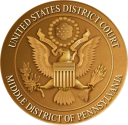MEDIATION IN THE UNITED STATES DISTRICT COURT
FOR THE MIDDLE DISTRICT OF PENNSYLVANIA
In May of 1994, the United States District Court for the Middle District of Pennsylvania implemented a mediation program to provide an alternative means of resolving civil disputes. The mediation program was created as part of the Court's Civil Justice Reform Act Expense and Delay Reduction Plan as required by the Civil Justice Reform Act of 1990. This page explains the background and concept of the mediation
For a current list of certified mediators, click here.
BACKGROUND OF MEDIATION PROGRAM
The Civil Justice Reform Act of 1990 required all federal courts to implement a Civil Justice Expense and Delay Reduction Plan by December 1, 1993. An advisory group, consisting of attorneys, lay persons, judges, and court administrators was formed to assist the court in the development of this plan. While the advisory group concluded that there was no significant delay or excessive cost in the processing of civil cases in the United States District Court for the Middle District of Pennsylvania, the group made a number of recommendations to fine-tune an already efficient system. The creation of a mediation program was one of the recommendations.
WHAT IS MEDIATION?
Mediation is defined as the intervention between conflicting parties to promote reconciliation, settlement, or compromise. Mediation is a dispute resolution process which is being used by both state and federal courts throughout the country as a means of resolving civil disputes. This process could result in cases being settled at earlier stages than through the traditional litigation process. Benefits of a mediated settlement may include reduced cost to the litigants and agreements which serve the underlying interests of the parties.
HOW MEDIATION WORKS IN THE MIDDLE DISTRICT
Local Rule 16.8 governs the mediation program in the Middle District of Pennsylvania. While the rule permits judges to order parties to mediation, it is anticipated that a majority of mediation sessions will be voluntary. When the Court determines that a case is appropriate for mediation, the judge and the parties will select a mediator from a list of certified mediators. A certified mediator must have been admitted to practice law for at least ten years and must have completed a two-day training course on mediation techniques offered by the Court. The mediators have agreed to provide this service free of charge. After the selection of a mediator, the judge will then enter an order referring the case to mediation.
The mediator will contact the parties to schedule a time to meet in an attempt to settle the lawsuit. All discussions with the mediator are confidential and the Local Rules prohibit the mediator from being called as a witness at the trial. The mediator will not try to impose a settlement on the parties, nor will he or she give legal advice. Rather, the mediator will promote better communication, explain the parties' respective interests and help develop options for settlement. The mediator may choose to meet several times with the parties. At the conclusion of the mediation, the mediator will submit a report to the Court. The mediator will not disclose any information discussed at the mediation session. Rather, the report the mediator submits to the Court will indicate only whether or not the mediation session was attended by the parties and counsel and whether it resulted in a settlement.
SUMMARY
The Court encourages parties to take advantage of this dispute resolution technique and welcomes any comments on the mediation program. If you have any comments, please contact Joe Barrett, ADR Coordinator, at (570) 207-5662.
U.S. DISTRICT COURT JUDGES
Honorable Matthew W. Brann, Chief Judge
Honorable Christopher C. Conner
Honorable Jennifer P. Wilson
Honorable Julia K. Munley
Honorable Karoline Mehalchick
Honorable Sylvia H. Rambo
Honorable Yvette Kane
Honorable Robert D. Mariani
Honorable Malachy E. Mannion
U.S. MAGISTRATE JUDGES
Honorable Joseph F. Saporito, Jr., Chief Magistrate Judge
Honorable Susan E. Schwab
Honorable William I. Arbuckle
Honorable Daryl F. Bloom
Honorable Martin C. Carlson (Recalled)
CLERK OF COURT
Peter J. Welsh, Clerk
